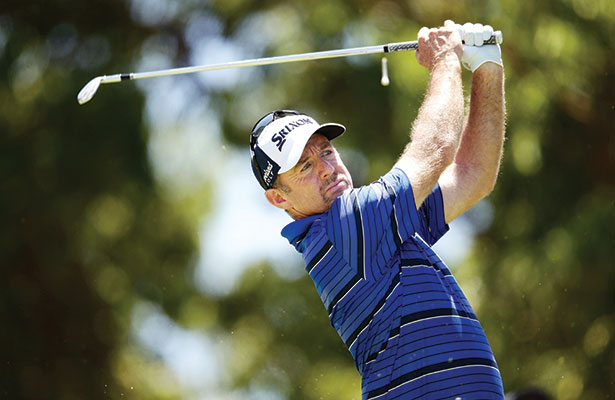Harnessing his raw talent for good, rather than evil, has allowed Rod Pampling to get the most out of his game.
It is 1993, my rookie year as a professional golfer. I’m in Mandurah and about to tee off in the first round of the West Australian Open. I’ve only been on tour four months, and it has been a brutal baptism. Moths are flying out of my wallet.
Meadow Springs Golf Club is eerily quiet and deathly still at 7am in the morning. No spectators, no caddies – just a lone starter on the tee, my two playing companions, and an uncomfortable weight of expectation hanging in the air.
I’ve never met the guys I’m drawn to play with. One is a trainee professional from QLD, an invitee momentarily emancipated from the tedium of selling Mars Bars in a pro shop somewhere north of Brisbane. On first impressions, he’s a fairly non-descript character. Average weight and height, slightly macho goatee and skin that hasn’t responded well to a life spent in the sun.
Cursory, somewhat distracted introductions are dispensed with, and it’s down to business.
The trainee takes to the tee, and follows with a violent, powerful swipe that sends his balata golf ball hissing skyward. It’s a strike that grabs the attention, as much for the control and penetration of the ball flight as the vicious speed generated in the process.
We walk down to our balls in the fairway, and he’s got me by 50 metres. Maybe I got mine out of the heel a little, I think to myself.
But that was as close as I got to Rod Pampling off the tee, all day. Not always straight, but always hit, his ball was taking pictures of mine as it sailed overhead, reducing the golf course to a pitch-and-putt exercise.
As focussed as I was upon the career life-and-death implications of the moment, there was something fascinating about Pampling’s rawness, and the infinite potential of his game.
Strangely enough, I was the one who made the cut for the weekend. As gifted as he was, Pampling had little idea how to harness this talent and power for good rather than evil.
When he came out on tour full-time in 1994, he spent most of the year backing up occasional brilliance with bog-standard ordinary golf, and found himself back at qualifying school at the end of the year after losing his card.

It was around this time Pampling made two pivotal career decisions. The first was seeking out Gold Coast swing coach, Gary Edwin, who must have felt like a trainer being given the reins to Phar Lap. To his credit, he simply put blinkers on and taught his horse how to run straight.
Harnessing Pampling’s power and reducing the scope of his misses was first priority. From that came an understanding of what fundamentals he could fall back on when things went awry. The positive outcomes were almost immediate.
The second was a fortuitous meeting a year or so later with Brisbane-based psychologist, Angela Burgess, who later became Pampling’s wife. Her mild-mannered persona disguised both steely determination and an eye for potential.
Soon after she arrived on the scene, big changes were implemented.
Almost immediately, Pampling was no longer involved in competitive, practice round ‘money matches’ with a group of equally talented peers during tournament preparations.
Then, under Burgess’ guidance, he began prioritising mental skills over physical, in the process rounding off some of the rough edges that contributed to his inconsistency.
The results speak for themselves. Pampling has had an outstanding career, registering two US PGA Tour victories and amassing $14 million in career earnings. There have been top-10 finishes in
Majors (2005 Masters), forays into the top 30 players in the world, and even an Australian Masters win.
Then in May this year, at the age of 45 and after losing his card on the US PGA Tour, Pampling defied the law of diminishing returns by finding his way once again to the winner’s podium at the BMW Charity Pro-Am, on the Web.com Tour.
It sets him up for a return to the big show in 2016, offering another chance to add a chapter to a story built around that rare occurrence – potential fulfilled.



